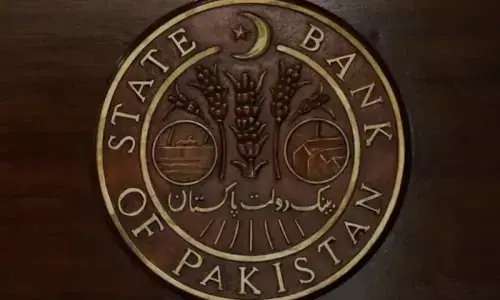The detailed verdict in the high treason case against former military ruler retired Gen Pervez Musharraf was released on Thursday, two days after the special court found the former president guilty of treason and handed him a death sentence.
The verdict is split 2-1, with Justice Shahid Karim of the Lahore High Court agreeing with Peshawar High Court Chief Justice Waqar Ahmad Seth and Justice Nazar Akbar of the Sindh High Court dissenting.
Key points:
- Verdict split 2-1
- Says military personnel who 'guarded, abetted' Musharraf should be held accountable
- Only one judge in favour of "exemplary punishment"
- Musharraf has 30 days to appeal verdict
"A dictator stays in power only as long as he manages to subvert the will of his people. The usurpation of the functions of government and other organs of State established by the Constitution tantamount to subversion of the Constitution. Exercise of undue influence over judiciary (such as making them cease office and/or take fresh extra-constitutional oath) do tantamount to subversion of the Constitution," says the 169-page detailed judgement, authored by Peshawar High Court Chief Justice Waqar Ahmad Seth.

Justice Seth, along with Justice Karim, said that the evidence presented had proved that Musharraf committed a crime. Justice Karim concurred with the findings and punishment, with the exception of paragraph 66 which mentions "dragging the body to D-Chowk".
"I dissent with the President [...] it has no basis in law and will be ultra vires for this court to do so. In my opinion it is enough to sentence the accused to death," said Justice Karim.
'Uniformed officers with boots on equally involved'
"It is patent by the act and conduct of the accused facing trial, that he has persistently and stubbornly strived ever since the commencement of this trial, to delay, retract and in fact evade it. It has been his plea throughout that either on account of ill health or for security hazards he could not reach up to this Court to face trial," said the judgement.
"If for a moment it is presumed that military high command including Corps Commanders were not involved then why they failed to defend and protect the Constitution of the Islamic Republic of Pakistan, 1973 by not restraining a man in uniform […] the then Corps Commanders Committee in addition to all other uniformed officers who were guarding him each and every time, with boots on, are equally and fully involved in the act and deeds of the accused person,” says the judgement.
"The trial of high treason is the requirement of the Constitution against those individuals who undermine or attempt to undermine the Constitution by any means. This court after presentation of undeniable, irrefutable and unimpeachable evidence by the prosecution against the accused reaches to the conclusion that indeed the accused is guilty and deserves exemplary punishment.
"As a necessary corollary to what has been observed we find the accused guilty as per charge. The convict be hanged by his neck till he dies on each count as per charge," says the verdict.

"We direct the law enforcement agencies to strive their level best to apprehend the fugitive/convict and to ensure that the punishment is inflicted as per law and if found dead, his corpse be dragged to the D-Chowk, Islamabad, Pakistan and be hanged for 03 days.
"Indeed, this portion of the judgement and execution is nowhere defined but since it is first impression cases and the sentence of death is announced in his absence after declaring the convict as proclaimed offender therefore the sentence is supposed to be executed.
“It would be in the interest of justice that all those involved (if any) in facilitation of the escape of the fugitive accused may also be brought in the net of due course of law and their criminal acts (if any) may be investigated and tried in accordance with law.”
Dissenting note
Justice Akbar pointed out that the definition of high treason was updated after passage of the 18th constitutional amendment in 2010, which he said was not intended to be applied retrospectively.
"I have respectfully gone through the proposed judgement authored by my brother Waqas Ahmad Seth J [...] with my humble comprehension of law and justice, I happened to dissent with majority view of my learned brothers," said Justice Akbar in his dissenting note.
Justice Akbar was of the view that Musharraf's actions of imposing emergency on November 3, 2007, could not be seen as "attracting provisions of Article 6 of the Constitution" on the said date.
"[Counsel] has failed to appreciate that on the date of offence [2007] except 'abrogate' and 'subvert' no other act of any person was considered as an offence under Article 6 of the Constitution. Only the act of 'abrogation' and 'subversion' of Constitution was considered as an act of high treason," the judge notes.
The words 'suspension' and 'abeyance' were not used in the language of Article 6 of the Constitution until 20.4.2010 when [they] were introduced through the 18th Amendment — almost after two and a half years of Musharraf imposing emergency.
"In the offence under Article 6 of the Constitution, the charging word is 'high treason', therefore, without properly appreciating what does it mean, this court cannot pass a just and fair verdict."
"But for this reason, both the learned counsel for the prosecution and my learned brothers have referred to the definition of 'high treason' by relying on the meaning of 'high treason' given in the Oxford Dictionary (Tenth Edition).
Death sentence
A special court in Islamabad on December 17 found Musharraf guilty of high treason and handed him a death sentence under Article 6 of the Constitution, marking the first time in Pakistan's history that a military chief has been declared guilty of high treason and handed a death sentence.
Article 6 of the Constitution says: “Any person who abrogates or subverts or suspends or hold in abeyance, or attempts or conspires to abrogate or subvert or suspend or hold in abeyance the Constitution by use of force or show force or by any other unconstitutional means shall be guilty of high treason."
The army had stood by Musharraf, with Maj Gen Asif Ghafoor, in a statement, saying that the "decision given by special court has been received with lot of pain and anguish by rank and file of Pakistan Armed Forces".
"An ex-Army Chief, Chairman Joint Chief of Staff Committee and President of Pakistan, who has served the country for over 40 years, fought wars for the defense of the country can surely never be a traitor," said the ISPR statement. "The due legal process seems to have been ignored including constitution of special court, denial of fundamental right of self defence, undertaking individual specific proceedings and concluding the case in haste."
"Armed Forces of Pakistan expect that justice will be dispensed in line with Constitution of Islamic Republic of Pakistan," he said.
The PTI-led government had termed the high treason trial against Musharraf “unfair”. “I will defend the law in the case but not any individual,” said Attorney General Anwar Mansoor in a late-night joint press conference on the day of the verdict.
The former military chief is currently in Dubai in the United Arab Emirates. He was admitted to a hospital following deterioration of his health earlier this month. The former military dictator broke his silence on Wednesday evening and expressed his gratitude to the armed forces and the people of Pakistan for "remembering his services" for the nation.
In a video that showed him lying on a medical bed, Musharraf also said that he would decide his future course of action after consulting his legal team.
“I have faith in Pakistan’s judiciary that they will provide me justice and keep in view the supremacy of law,” he said.



































